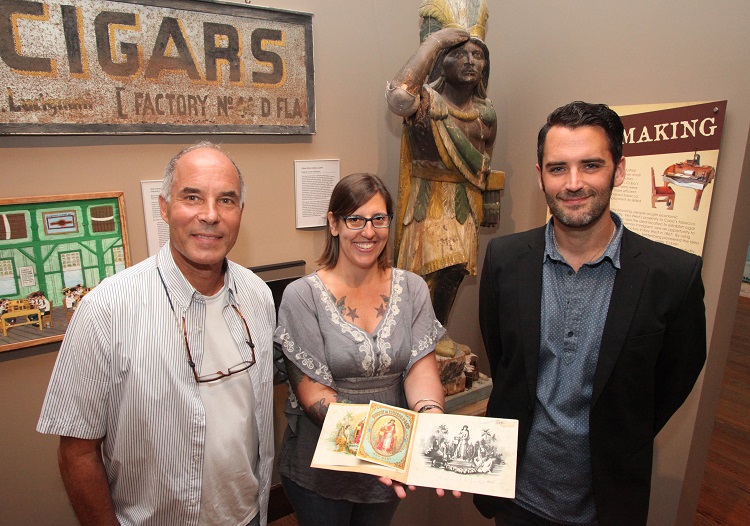Florida Keys Man Discovers Rare Gato Cigar Progressive Proof Book, Now on Exhibit at Custom House Museum

Andrew Bulla, a Florida Keys man who discovered a regional treasure while shopping for vintage car parts on eBay, has placed his find into the hands of the Key West Art & Historical Society in a gesture to foster its cultural and historical preservation. The one-of-a-kind, mint-condition cigar label progressive proof book created for and signed in 1897 by Eduardo Hidalgo Gato, founder of the E. H. Gato Cigar Factory, has been digitized for online viewing in the future, and is now on display in the ‘Industries of Key West’ exhibit in the Dogwood 2 Gallery on the second floor of the Custom House Museum, 281 Front Street.
“We commend Mr. Bulla for recognizing the historical and cultural importance of the cigar progressive proof book, and for determining that such a significant piece needs to be preserved in a museum for future generations,” says Society Curator Cori Convertito, Ph.D.
The rare, twenty-page progressive proof booklet features eight individual lithographs used during the printing process and the finished label in full color, with handwritten notes presumed to be Gato’s—one of Key West’s largest and most successful cigar factory owners. Key West’s burgeoning cigar industry developed shortly after the early 19thcentury, which witnessed the dawn of the Industrial Revolution and Cuba’s own cigar-making industry and tobacco plantations. By 1873, Key West had 15 factories employing over 1,200 local and immigrant workers. By 1890, more than 100 million cigars were handmade in Key West, and the city was the largest and wealthiest in the state of Florida.
Bulla, manager for Florida Keys WestCare and former manager of the Health Department who has an affinity for historic preservation and the Gato building (and its memorabilia) that housed his health department office for eight years, stumbled upon the book while shopping for car parts on eBay. The book was part of an estate liquidation; the seller’s grandfather was a tobacco wholesaler from 1915 through the 1930s. He had business with The Gato Cigar Company in Key West, and the booklet was likely an acquisition from that time. Upon arrival, Bulla determined that the booklet “needed to be showcased so that everyone who comes to Key West can see it and can get the drift of what’s behind it,” he says.
“The big deal in cigar collecting is usually the box itself, and here we have the link, commissioned by the man himself. That’s what makes this a cultural treasure, and there’s not another one like it,” he says. “It would be selfish to huck it to a collector where no one can appreciate and learn from it. I’m just a passing steward. That’s all I am. I got a hold of it, and now I’m just paying it forward.”
For more information or to make your own contribution to The Society’s collection, contact Curator Cori Convertito, Ph.D. at cconvertitofarrar@kwahs.org or 305.295.6616 x112. Your Museums. Your Community. It takes an Island.

